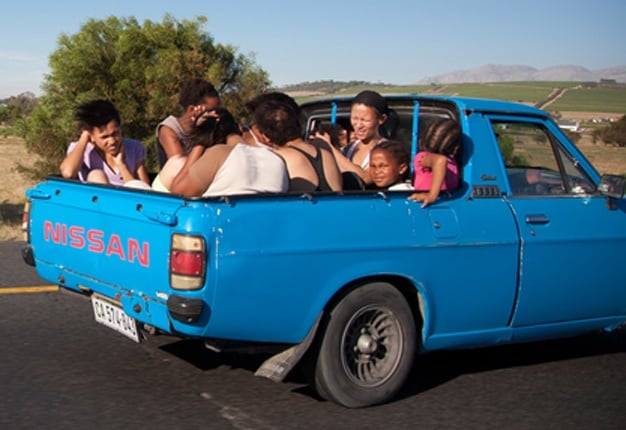
South Africa - From May 11 2017, it will become illegal to transport school children for reward (i.e paying a driver) in the goods compartment of a bakkie.
Many organisations, including the Department of Transport have lauded this as being a giant stride in the right direction for road safety.
Law for All said: "It is no secret that the overfilling of taxis and bakkies has resulted in thousands of young, innocent children losing their lives on their way to school.
An end to bakkie-taxis? 'DoT should ban transportation of people on bakkies' - JPSA
"While there are many contributing factors to this, government aims to put a stop to the unnecessary deaths of pupils with amendments to laws relating to scholar transport."
Parent24 editor Sophia Swanepoel says: "It’s a good step forward, but I still don’t understand: if all kids 3 and under should legally be strapped into car seats, and all passengers should wear seat belts, then how can it still be legal to transport people, including children, on the back of a bakkie?"I realise we have a shortage of appropriate vehicles to transport people safely, but it should never be allowed that school buses and taxis transporting kids – or anyone – don’t have seat belts. And tragically, our road death toll supports the vital need for this."
Here’s what you need to know about new bakkie laws in SA:
1. It’s always been illegal to transport children at the back of a bakkie for payment
According to Law for All legal expert, advocate Jackie Nagtegaal, changes to the national road traffic regulations act, which officially come into effect from May 11 2017, forbids anyone to transport schoolchildren in the goods section of a vehicle for remuneration.
Nagtegaal says: "Remember, it’s always been illegal to transport people on the back of a bakkie for any form of payment, but many people only found this out when the amendments made headlines."
2. The “goods compartment” is not designed to carry people
The law, simply put, means that nobody may be transported in any section of a vehicle (car, bakkie, hatchback or minibus) that is not designed for people; for example, the boot of a car or the loadbay of a bakkie, for payment.
Nagtegaal explained: "It makes sense if one takes into account that there are no safety devices installed such as seatbelts and airbags."
What do you think of the proposed road laws regarding transporting people in the load bay of a bakkie? Will this curb road deaths? Email us
3. It’s illegal for “bakkie-taxis” to transport children to school
The so-called “bakkie-taxis”, which are often the only form of public transport for learners in informal areas of the country, will have to stop transporting schoolchildren. Nagtegaal added: "Drivers who are pulled over will be fined and have their vehicles impounded for not complying with regulations. Drivers that don’t obey the law, could face the following:
• R2500 fine when the vehicle is confiscated
• R7000 fine to have the impounded vehicle released (first offence)
• R10000 fine to have the impounded vehicle released (second offence)
• R15000 fine to have the impounded vehicle released (third offence)
She adds: "Remember the fourth time that a vehicle is impounded, the driver will lose ownership and it will become government property."
READ: An end to bakkie-taxis? 'DoT should ban transportation of people on bakkies' - JPSA
4. Drivers must comply with specific regulations
Nagtegaal: "There are strict rules and regulations for drivers who wish to transport children to and from school legally."
Vehicles must:
• Not be older than 12 years old;
• Be registered and licensed in the relevant province;
• Pass a roadworthy test (every 6 months);
• have a valid operating licence;
• Clearly specify the number of passengers allowed in the vehicle;
• Provide a seatbelt for every child;
• Be clearly marked as a form of ‘scholar transport’;
• Be equipped with a fire extinguisher and first aid kit;
• Have a passenger list of all of the children who are being transported, and
• Have copies of each child’s birth certificate or identity document (ID) in case of an accident.
Drivers must have:
• A professional driving permit/licence;
• A valid ID and important documents (stipulating which kind of vehicle the driver may drive, and the name of the owner or holder of the operating license);
• A first aid certificate;
• A qualification for advanced and defensive driving;
• Another responsible adult driver accompanying in the vehicle when pre-primary and primary learners, or learners with physical, mental or visual needs are transported;
• A letter of agreement with the school or letter from the principal explaining the need for the service, or a letter from the parents;
• A description of the route to and from school; and
• A valid tax clearance certificate from the South African Revenue Service (SARS).
5. Parents need to make alternative arrangements
Parents only have a few more days to make new transport arrangements for their children. The first option is to contact the school immediately and find out if it offers transport for learners or could recommend transporting services.
If the school cannot assist, parents should consider coming together and starting a carpool of sorts. Of course, this is by no means ideal since it is based on the assumption that a community has access to vehicles. Public transport is also an option, and while it might not always be convenient, it’s definitely a safer alternative compared to a bakkie-taxi.
Nagtegaal adds: “Another option is to touch base with your local government and ask about possible subsidised transport options. You could rally other parents and start a petition that calls for safe and affordable transportation for schoolchildren.”
"Legal technicalities and regulations aside, it’s important not to lose sight of what’s at stake here: children’s lives and education. South Africa needs to come to together and work thoroughly to protect learners and ensure that they have access to schools."




 Publications
Publications
 Partners
Partners











